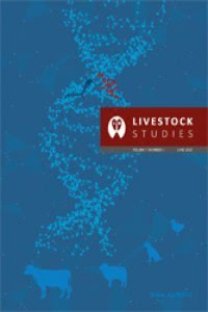KARACABEY MERİNOSLARINDA ÖNEMLİ VERİM ÖZELLİKLERİNİ SELEKSİYONLA GELİŞTİRME OLANAKLARI. I. ÇEŞİTLİ ÖZELLİKLER BAKIMINDAN PERFORMANS DÜZEYLERİ
Bu çalışma, Karacabey Merinoslarının genel verim düzeylerinin ortaya konulması, bazı çevre faktörlerinin bu özellikler üzerindeki etkilerinin incelenmesi, verim özelliklerine ait fenotipik ve genetik parametrelerin saptanması ve böylece bu koyun ırkının verimlerinin seleksiyonla iyileştirilmesi olanaklarının açıklanması amacıyla yapılmış geniş bir çalışmanın birinci bölümünü oluşturmaktadır. Araştırmanın bu bölümünde sürünün çeşitli özellikler bakımından performans düzeylerinin ortaya konulması üzerinde durulmuştur. Koçaltı koyun sayısına göre, östrus göstererek tohumlananların oranı % 93.1, gebelik oranı % 81.5, doğum oranı % 79.5 ve ikiz doğum oranı % 7.57’ dir. Kuzuların 60 ve 120. günlüğe kadar ki yaşama güçleri sırasıyla % 97.5 ve % 94.7 olarak saptanmıştır. Kuzuların ortalama doğum ağırlıkları tek erkek ve tek dişilerde sırasıyla 4.48 ve 4.32 kg, ikiz erkek ve ikiz dişilerde 4.21 ve 4.06 kg bulunmuştur. Ortalama 60 gün ağırlığı tek erkek ve tek dişilerde 22.0 ve 20.7 kg, ikiz erkek ve ikiz dişilerde 18.5 ve 17.9 kg’ dır. Bu gruplarda ortalama 120 gün (sütten kesme) ağırlığı sırasıyla 38.3, 33.9, 33.9 ve 31.0 kg; 180 gün ağırlığı 47.1, 36.9, 43.1 ve 34.4 kg olarak bulunmuştur. Anaç koyunlarda kırkım sonu canlı ağırlığı 62.6 kg, kirli yapağı verimi 3.35 kg, lüle uzunluğu 6.18 cm ve elyaf çapı 20.27 mikrondur. Araştırmada elde edilen sonuçlar, Karacabey merinoslarının önemli verim özellikleri ve yaşama gücü yönünden üstün bir performans seviyesine sahip olduğunu göstermiştir. Ancak ikiz doğum oranı bu ırk için düşük düzeyde bulunmuştur. Bu da söz konusu özelliğin geliştirme olanaklarının incelenmesine gereksinim olduğunu göstermektedir.
Possibilites of Improving important Production Characteristics of Karacabey Merino Through Selection. I. Performance Levels for Different Characteristics
This paper is concerned with a study carried out the Karacabey Merino flock to investigate the general production level, the effect of some environmental factors on these traits and to obtain estimates of phenotypic and genetic parameters of production characteristics in order to study the possibilities of improving production characteristics of this breed through selection. In this part of study, performance levels for different characteristics in the flock have been considerend. On the basis of number of ewes assigned for mating, 93.1 % showed estrus and inseminated, 81.5 % were pregnant and 79.5 % lambed; showed rate was 7.57 %. Of the live lambs born, 97.5 % survived to 60 days and 94.7 % to 120 days (weaning). Average birth weights for single-born male and female lambs were 4.48 and 4.32 kg and those for twinborn males and females 4.21 and 4.06 kg respectively. Average 60 day weights, for singleborn male and female lambs 22.0 and 20.7 kg and those for twin born males and females 18.5 and 17.9 kg respectively. 120 days (weaning) weight averaged 38.3, 33.9, 33.9 and 31.0 kg, and 180 days weights 47.1, 36.9, 43.1 and 34.4 kg, in the above order. Average body weight of breeding ewes after shearing were 62.6 kg. The following average values have been obtained for the wool characteristics of breeding ewes, greasy fleece weight 3.35 kg, staple lenght 6.18 cm and fiber diameter 20.27 micron. The results of this study have shown that Karacabey Merino sheep has a very statisfactory performance in respect of important production characteristics and survival rate. However twinning rate was found low for this breed. It has shown that study concerning improvement of this trait is required.
- Yayın Aralığı: Yılda 2 Sayı
- Başlangıç: 1959
- Yayıncı: Sezer ÖZ
Sayıdaki Diğer Makaleler
SIĞIR EMBRİYOSUNUN DONDURULMASI VE TRANSFERİ
Hüseyin SUNGUR, Nafiz YURDAYDIN
İrfan DAŞKIRAN, Mehmet ERTUĞRUL
ESMER IRK DANALARDA BESİ BAŞI AĞIRLIĞININ BESİ PERFORMANSI VE BESİ EKONOMİSİNE ETKİSİ
Rafet ARPACIK, Ahmet NAZLIGÜL, Zeki BEYHAN, Fatih ATASOY
SAF VE MELEZ DOĞU ANADOLU KIRMIZISI ERKEK TOSUNLARININ BESİ PERFORMANSI ÜZERİNE BİR ARAŞTIRMA
Zafer ULUTAŞ, Ömer AKBULUT, Naci TÜZEMEN, Abdulkadir ÖZLÜTÜRK, Cengiz YALÇIN
KANGAL KÖPEKLERİNDE BAZI MORFOLOJİK ÖZELLİKLER
